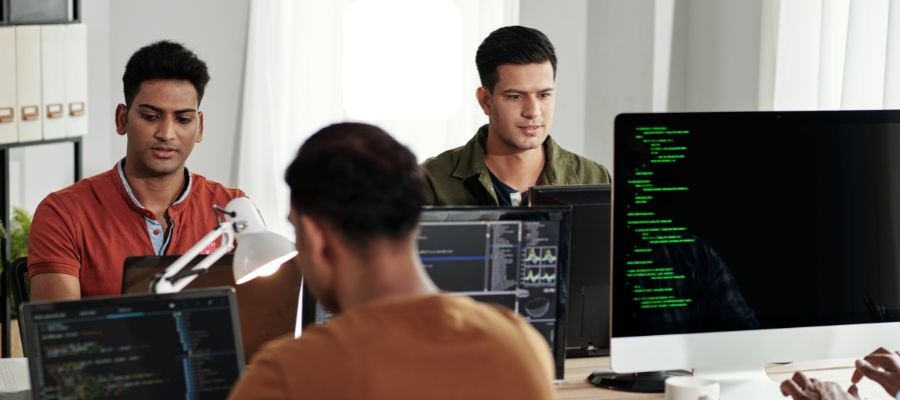There are no items in your cart
Add More
Add More
| Item Details | Price | ||
|---|---|---|---|

Artificial intelligence is proving to be a major asset for Google's engineering teams, says CEO Sundar Pichai. In a recent podcast with researcher Lex Fridman, Pichai revealed that AI tools are boosting productivity, helping software engineers work about 10% faster.
Tue Jun 10, 2025, 5 min read.
Google has implemented a system to track the time engineers save each week using AI-powered tools. These efficiency gains allow teams to focus on more critical tasks, accelerating the company’s progress. Pichai emphasized that Google is carefully monitoring these improvements, and early results indicate a significant positive impact. Beyond Assistance—The Rise of AI Agents Pichai sees AI evolving beyond simple suggestions and code assistance. He highlighted Google’s vision for AI agents—tools capable of making decisions, performing actions autonomously, and managing routine tasks without constant human oversight. This shift, he believes, will redefine the way work is done, marking the next major breakthrough in AI-driven efficiency. Google’s AI-Powered Engineering Internally, Google is already leveraging AI through "Goose," an AI tool designed to assist engineers in writing code. Trained on decades of technical data, Goose and other AI-powered systems contribute significantly to development efforts—over 30% of new code written at Google is now AI-generated, up from 25% just months ago. The Competitive AI Landscape Google isn’t alone in this pursuit. Microsoft reports that AI-generated code makes up 40% of development through GitHub Copilot. Meanwhile, Meta CEO Mark Zuckerberg has suggested AI could soon handle half of Meta’s developer work. AI as a Tool—Not a Replacement Despite AI’s growing role, Pichai stresses that human expertise remains essential. Google plans to hire more engineers next year, expecting AI to handle mundane tasks so professionals can focus on more creative and impactful work. Speaking with Bloomberg, he clarified that Google views AI as a complement to human talent—not a substitute. Navigating AI’s Broader Impact While AI speeds up workflows, discussions about job displacement remain relevant. Pichai acknowledged concerns raised by Anthropic CEO Dario Amodei, who warned AI could replace a large number of entry-level white-collar jobs in the near future. However, Pichai advocates for open conversations on the broader implications of AI in employment. As AI continues to evolve, its role in engineering and workflow automation is expanding rapidly—positioning AI agents as the next transformative leap in workplace efficiency. Let me know if you'd like any further tweaks! I can refine the tone or add specific details to match your vision.
Beyond Assistance—The Rise of AI Agents
Pichai sees AI evolving beyond simple suggestions and code assistance. He highlighted Google’s vision for AI agents—tools capable of making decisions, performing actions autonomously, and managing routine tasks without constant human oversight. This shift, he believes, will redefine the way work is done, marking the next major breakthrough in AI-driven efficiency.
Google’s AI-Powered Engineering
Internally, Google is already leveraging AI through "Goose," an AI tool designed to assist engineers in writing code. Trained on decades of technical data, Goose and other AI-powered systems contribute significantly to development efforts—over 30% of new code written at Google is now AI-generated, up from 25% just months ago.
The Competitive AI Landscape
Google isn’t alone in this pursuit. Microsoft reports that AI-generated code makes up 40% of development through GitHub Copilot. Meanwhile, Meta CEO Mark Zuckerberg has suggested AI could soon handle half of Meta’s developer work.
AI as a Tool—Not a Replacement
Despite AI’s growing role, Pichai stresses that human expertise remains essential. Google plans to hire more engineers next year, expecting AI to handle mundane tasks so professionals can focus on more creative and impactful work. Speaking with Bloomberg, he clarified that Google views AI as a complement to human talent—not a substitute.
Navigating AI’s Broader Impact
While AI speeds up workflows, discussions about job displacement remain relevant. Pichai acknowledged concerns raised by Anthropic CEO Dario Amodei, who warned AI could replace a large number of entry-level white-collar jobs in the near future. However, Pichai advocates for open conversations on the broader implications of AI in employment.
As AI continues to evolve, its role in engineering and workflow automation is expanding rapidly—positioning AI agents as the next transformative leap in workplace efficiency.

Prolander Tech.
Technology & Consulting @Prolander Tech.